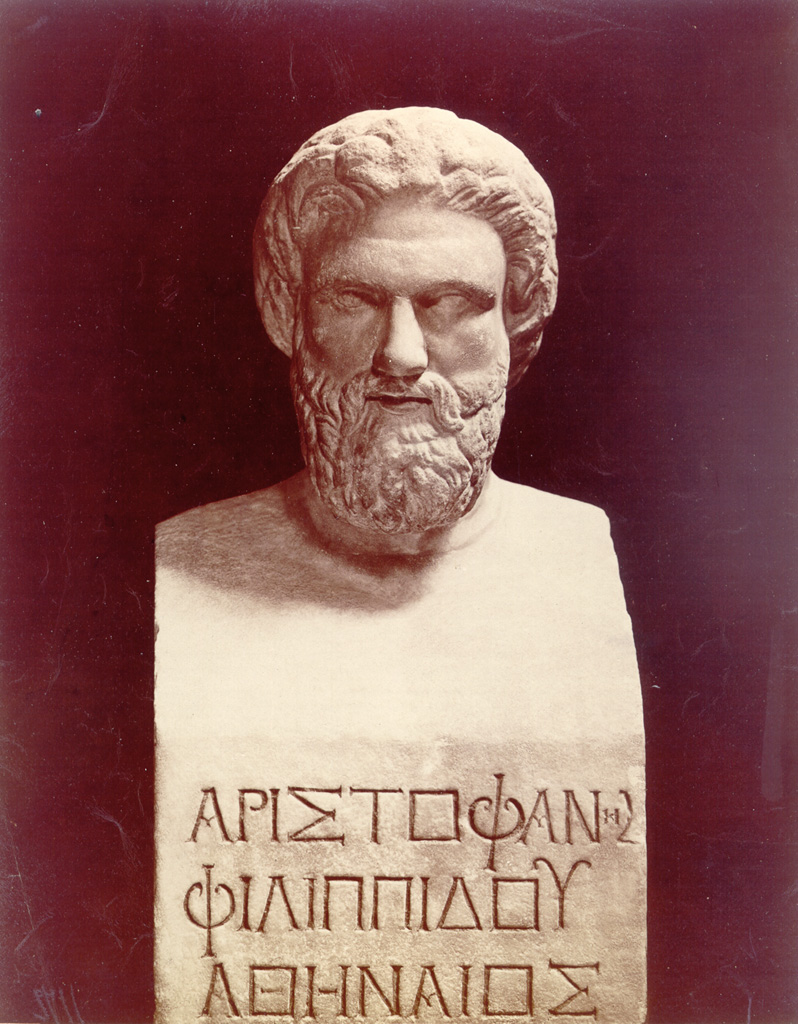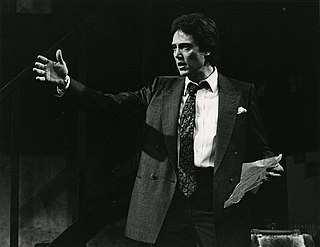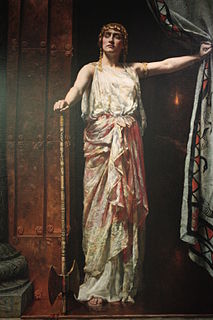
Aristophanes, son of Philippus, of the deme Kydathenaion, was a comic playwright of ancient Athens. Eleven of his forty plays survive virtually complete. These provide the most valuable examples of a genre of comic drama known as Old Comedy and are used to define it, along with fragments from dozens of lost plays by Aristophanes and his contemporaries.

Aeschylus was an ancient Greek tragedian. He is often described as the father of tragedy. Academics' knowledge of the genre begins with his work, and understanding of earlier tragedies is largely based on inferences from his surviving plays. According to Aristotle, he expanded the number of characters in the theater and allowed conflict among them; characters previously had interacted only with the chorus.

Sophocles is one of three ancient Greek tragedians whose plays have survived. His first plays were written later than or contemporary with those of Aeschylus, and earlier than or contemporary with those of Euripides. Sophocles wrote over 120 plays during the course of his life, but only seven have survived in a complete form: Ajax, Antigone, Women of Trachis, Oedipus Rex, Electra, Philoctetes and Oedipus at Colonus. For almost 50 years, Sophocles was the most celebrated playwright in the dramatic competitions of the city-state of Athens that took place during the religious festivals of the Lenaea and the Dionysia. He competed in 30 competitions, won 24, and was never judged lower than second place. Aeschylus won 13 competitions, and was sometimes defeated by Sophocles, while Euripides won four competitions.

Tragedy is a form of drama based on human suffering that invokes an accompanying catharsis or pleasure in audiences. While many cultures have developed forms that provoke this paradoxical response, the term tragedy often refers to a specific tradition of drama that has played a unique and important role historically in the self-definition of Western civilisation. That tradition has been multiple and discontinuous, yet the term has often been used to invoke a powerful effect of cultural identity and historical continuity—"the Greeks and the Elizabethans, in one cultural form; Hellenes and Christians, in a common activity," as Raymond Williams puts it.

In theatre, a monologue is a speech presented by a single character, most often to express their mental thoughts aloud, though sometimes also to directly address another character or the audience. Monologues are common across the range of dramatic media, as well as in non-dramatic media such as poetry. Monologues share much in common with several other literary devices including soliloquies, apostrophes, and asides. There are, however, distinctions between each of these devices.

A Greek chorus, or simply chorus in the context of Ancient Greek tragedy, comedy, satyr plays, and modern works inspired by them, is a homogeneous, non-individualised group of performers, who comment with a collective voice on the dramatic action. The chorus consisted of between 12 and 50 players, who variously danced, sang or spoke their lines in unison and sometimes wore masks.
Peripeteia is a reversal of circumstances, or turning point. The term is primarily used with reference to works of literature. The Anglicized form of peripeteia is peripety.
Greek tragedy is a form of theatre from Ancient Greece and Asia Minor. It reached its most significant form in Athens in the 5th century BC, the works of which are sometimes called Attic tragedy. Greek tragedy is widely believed to be an extension of the ancient rites carried out in honor of Dionysus, and it heavily influenced the theatre of Ancient Rome and the Renaissance. Tragic plots were most often based upon myths from the oral traditions of archaic epics. In tragic theatre, however, these narratives were presented by actors. The most acclaimed Greek tragedians are Aeschylus, Sophocles and Euripides.

Thesmophoriazusae, or Women at the Thesmophoria is one of eleven surviving plays by Aristophanes. It was first produced in 411 BC, probably at the City Dionysia. The play's focuses include the subversive role of women in a male-dominated society; the vanity of contemporary poets, such as the tragic playwrights Euripides and Agathon; and the shameless, enterprising vulgarity of an ordinary Athenian, as represented in this play by the protagonist, Mnesilochus. The work is also notable for Aristophanes' free adaptation of key structural elements of Old Comedy and for the absence of the anti-populist and anti-war comments that pepper his earlier work. It was produced in the same year as Lysistrata, another play with sexual themes.
Revenge tragedy is a theoretical genre in which the principal theme is revenge and revenge's fatal consequences. Formally established by American educator Ashley H. Thorndike in his 1902 article "The Relations of Hamlet to Contemporary Revenge Plays," a revenge tragedy documents the progress of the protagonist's revenge plot and often leads to the demise of both the murderers and the avenger himself.
In literature, the deuteragonist or secondary main character is the second most important character, after the protagonist and before the tritagonist. The deuteragonist may switch between supporting and opposing the protagonist, depending on the deuteragonist's own conflict or plot.

Senecan tragedy refers to a set of ancient Roman tragedies. Ten of these plays exist, of which most likely eight were written by the Stoic philosopher and politician Lucius Annaeus Seneca. The group includes Hercules Furens, Medea, Troades, Phaedra, Agamemnon, Oedipus, Phoenissae, Thyestes, Hercules Oetaeus, and Octavia. Hercules Oetaeus is generally considered not to have been written by Seneca, and Octavia is certainly not. In the mid-16th century, Italian humanists rediscovered these works, making them models for the revival of tragedy on the Renaissance stage. The two great, but very different, dramatic traditions of the age—French neoclassical tragedy and Elizabethan tragedy—both drew inspiration from Seneca. Usually, the Senecan tragedy focuses heavily on supernatural elements.
Oedipus is a fabula crepidata of c. 1061 lines of verse that was written by Lucius Annaeus Seneca at some time during the 1st century AD. It is a retelling of the story of Oedipus, which is better known through the play Oedipus Rex by the Athenian playwright, Sophocles. It is written in Latin. The play is generally considered one of Seneca's weaker works.

Drama is the specific mode of fiction represented in performance: a play, opera, mime, ballet, etc, performed in a theatre, or on radio or television. Considered as a genre of poetry in general, the dramatic mode has been contrasted with the epic and the lyrical modes ever since Aristotle's Poetics —the earliest work of dramatic theory.

Philoctetes is a tragedy by the Athenian poet Euripides. It was probably first produced in 431 BCE at the Dionysia in a tetralogy that included the extant Medea and was awarded third prize. It is now lost except for a few fragments. Much of what we know of the plot is from the writings of Dio Chrysostom, who compared the Philoctetes plays of Aeschylus, Euripides and Sophocles and also paraphrased the beginning of Euripides' play.

Agamemnon is a fabula crepidata of c. 1012 lines of verse written by Lucius Annaeus Seneca in the first century AD, which tells the story of Agamemnon, who was killed by his wife Clytemnestra in his palace after his return from Troy.
Fiona Macintosh is Professor of Classical Reception at the University of Oxford, Director of the Archive of Performances of Greek and Roman Drama, Curator of the Ioannou Centre, and a Fellow of St Hilda's College, Oxford.













